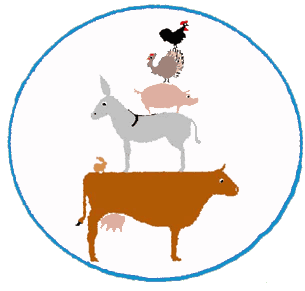
Production (in french)
Actuality (in french)
Views of some rare breeds (in french)
|
|
|
|---|---|
|
Production (in french) |
|
|
Actuality (in french) |
|
|
Views of some rare breeds (in french) |
|
|
|
FERME is a French voluntary association founded in 1990. Its name is the acronym for 'Fédération pour promouvoir l'Elevage des Races domestiques MEnacées' (Association for the Promotion of Endangered Domestic Breeds).
Originally based at Université Lyon I, our headquarters have now moved to Grézieux-le-Fromental in the Massif Central.
We are independent of any political, religious and administrative power. We receive no public or private subsidies so as to guarantee our full independence.
Our aim is to 'preserve rare
domestic animal breeds as a socio-economic heritage and genetic
stock, through the promotion of their natural distinctive qualities
and the use of all available legal means'.
We are all volunteers of very different origins:
Professional and amateur breeders
Vets, agricultural engineers, biology teachers
People whose professional activity has nothing to do with farm animals, but who are concerned about the preservation of a pluri-millenial agricultural heritage and age-old traditions.
Since FERME has members in all parts of France, most of our work is done by mail, telephone and fax.
Nevertheless, we hold a monthly meeting either in LYON (9 rue Dumenge), or at a member's house, in the country.
Four times a month, we gather at one of our members' houses for the editorial work on our journal, Le Journal de Ferme. This is also a social occasion, with a guided visit of our hosts' farm and a good meal.
We are in contact with other associations and societies with aims similar or complementary to ours, in France and abroad.
|
Contact address |
Association FERME c/o Georges JOUVE Le Bourg 42600 Grézieux-le-Fromental email : mailto:ferm@chez.com |
When FERME was created, over 70 rare French domestic animal breeds were in danger of extinction. In order to rationalise breeding, agricultural authorities were thinking of limiting the number of breeds for each type of production to only one or two. The criteria for the selection of suitable breeds were set exclusively according to industrial requirements, and in complete contempt of local traditions. This meant,
that small traditional farms were doomed to disappear, particularly in difficult areas
that the cow, sheep or chicken were to become standardised products (standardised breeds raised on standardised feed, on standardised farming premises)
that an extraordinarily rich and varied genetic stock was to become irremediably lost
that this unique aesthetic and cultural heritage was to be lost forever
Today, thanks to the devoted work of a number of
individuals and associations (among which FERME), there is a growing
interest in local breeds and their preservation.
What has changed over the past ten years:
horrified by Mad Cow Disease, and the use of hormones and antibiotics to fatten animals, consumers now demand safe products from animals raised in as natural conditions as possible (suckling calves, corn-fed chickens, etc.)
the EU has established 'Standards of Geographic Origin' which guarantee the genuine 'native' taste of local products and produce.
there has been a growing awareness of the genetic deterioration of the 'wonder' breeds narrowly selected in the past
unemployment has led many people to complement their unemployment allowance with a small income from breeding activities; they are only able to invest minimal sums and their choice of rustic breeds adapted to their local environment is an obvious one
the notion of national heritage has been extended to include domestic animal breeds, insofar as they have always played an essential part in Man's activities
Sorry, but those pages are in french
Links with breeders (over 1,000 addresses)
Information: Journal de FERME